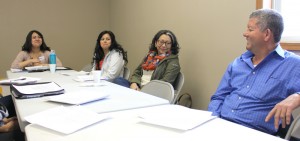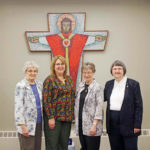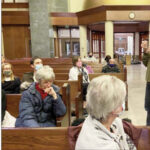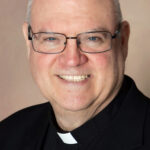(Editor’s note: Catholics looking for ways to put faith into practice during Lent and beyond can get inspiration from others around the diocese working to make the world a better place in which to live. Each week during Lent we’ll profile projects, people and activities striving to make a difference.)
By Barb Arland-Fye
The Catholic Messenger
WEST LIBERTY —During an event intended to raise Latinos’ awareness about cancer and its prevention, a mother gave an emotional, impromptu speech about her dying daughter. Silvia Moran’s heartfelt words deeply touched participants of the community forum at St. Joseph Parish. They were inspired to focus their efforts on raising awareness about cervical cancer among West Liberty area Latinos.

Advisory Board members of a health study met with a University of Iowa research team March 1 at St. Joseph Parish in West Liberty to discuss an educational campaign to raise awareness among West Liberty area Latinos about cervical cancer. Pictured are research assistant Mayra Martinez (far end), advisory board member Maria Toribio, researcher Barbara Baquero, and advisory board member Jose Duran.
The educational campaign started March 8 after the Spanish Mass at St. Joseph’s because of the central role the parish plays in bringing Latinos together. The new initiative is an outgrowth of a “Photovoice” project that University of Iowa researchers conducted with West Liberty community members.
“We are working in partnership with members of the Latino community and St. Joseph’s,” ex-plained Jason Daniel-Ulloa, assistant research scientist in the University of Iowa’s Community and Behavioral Health Depart-ment.
A catalyst in the partnership is Father Greg Steckel, pastor of St. Joseph’s, himself a colon cancer survivor. He has learned in his 2-1/2 years in West Liberty that Latinos are generally reluctant to talk about cancer and often don’t seek medical care until pain is intense.
Daniel-Ulloa noted that rural states such as Iowa have trouble providing access, outreach and services to communities as it is. “When we introduce this growing (Latino) community, providers might not have the resources or the training to reach out to the group.” According to census information, West Liberty’s population is 51.2 percent Hispanic – 1,915 individuals out of a total population of 3,726.
Through photographic and video images, the Photovoice project focused on exploring issues and priorities regarding cancer prevention in the community. “All of the topics revolved around cancer and cancer prevention particular to Latinos,” said Daniel-Ulloa.
Photovoice participants celebrated the project’s conclusion with a community forum at which the grieving Silvia Moran, who is a grandmother and parishioner of St. Joseph’s, gave her impassioned talk last summer. Her daughter Claudia’s death from cervical cancer shortly after the forum got the community partners thinking: “This project is great, but how do we work to prevent future cervical cancer deaths?” Daniel-Ulloa said.
“That led to the current initiative: to educate Latinos in the West Liberty area about cervical cancer and its prevention – including a vaccine called HPV.” The work is funded in part by the Iowa Cancer Consortium and the Iowa Prevention Research Center, which is funded by the Centers for Disease Control and Prevention.
Community partners decided to call their new initiative “Despierta a Tu Salud (Wake Up to Your Health): HPV Study.”
(See More on Page 9)
It consists of two education sessions. Parents and youths will learn about Human Papillomavirus (HPV); the vaccine to inoculate against it; cancers linked to HPV; skills to overcome problems parents are having in getting their children vaccinated; and where to go for the vaccine. A similar project is being conducted with the African American community in Iowa City.
African American and Latina women are more likely to be diagnosed with cervical cancer and to die from the disease than other ethnic/racial groups in the U.S., according to an HPV study handout. HPV is believed to cause about 90 percent of all cervical cancer in the U.S. and is also linked to head, neck and throat cancer for men and women. The vaccine is recommended for youths ages 11-15.
The second education session for the West Liberty community will be March 22, with separate sessions for parents and youths. A narrative video titled “The Tamale Lesson,” about a family preparing for Quinceanera (a coming of age celebration), provides a conversation starter. Community partners hope the education sessions will inspire parents and youths to spread the program’s reach to the broader Latino community.
Ultimately, the project seeks to increase level of acceptance for the HPV vaccination, percentage of parents planning to get HPV vaccinations for their children, and the number of youths who have started/completed the HPV vaccination series. The research team includes Daniel-Ulloa; his spouse, Barbara Baquero, an assistant professor in the University of Iowa’s Department of Health; and around 15 U of I students who serve as research assistants.
Fr. Steckel said he agreed to the partnership because of the U of I researchers’ approach to engage the community in the work. “Their approach is to establish a relationship over a long period of time … you don’t come in as ‘Lady Bountiful,’ do good and then leave. You establish a relationship and stick with it.”
Daniel-Ulloa says his department’s work is dependent on the community partners. “I believe we need them more than they need us. The community is strong and has resources and capacity to identify and solve their own problems. Our group asks if we can be part of that and lend our skills and talents where they might best be applied.”
Advisory Board members for the HPV study met with the research team on March 1 to map out plans for the education sessions.
“This is a good idea,” said advisory board member Jose Duran, a parishioner at St. Joseph’s. “This information will help “you to take care of your health,” he added.
“We’ll spread the word with family and friends and maybe they’ll say something to others … like a chain. We’ll just try to be helpful,” added Maria Toribio, also an advisory board member and parishioner at St. Joseph’s.
“We try not to ‘helicopter’ in (do a project and then leave). We look at: how can we continue the capacity of the partners we’re dealing with,” Daniel-Ulloa said. “Fr. Greg, for instance, has gained a better understanding of his Latino congregation. If we can increase the relationships people have to make a healthier community –that’s what we’re here for.”
Collaborating in West Liberty
Father Greg Steckel, pastor of St. Joseph Parish in West Liberty, realizes that not all Latinos are Catholic and that collaboration with religious and secular entities is essential for the rural community’s wellbeing.
A project the parish partnered in called “Photovoice,” which raised awareness about cancer, also stimulated interest in collaboration among various groups in West Liberty. The annual Latino Festival fundraiser last fall, for example, increased visibility of the Rotary Club’s efforts, encouraged voter registration and provided information about unions, health care and other topics.
The West Liberty coalition, which meets at the Eulenspiegel Puppet Theatre Co. in town, addresses quality of life issues. Representatives include the Rotary and LULAC clubs, St. Joseph Parish, Muscatine County Health, the mobile health clinic, and the University of Iowa’s Department of Health.
“We need to reach out to all members of the community, not just Latinos, but that’s the main population; they’re underserved at this point,” Fr. Steckel said. “We call it cultural humility. It’s the understanding that says, ‘I have a lot to learn,’” he continued. “And there’s always lots to learn,” added Jason Daniel-Ulloa, the University of Iowa assistant research scientist collaborating on health initiatives with the West Liberty community.
“We may be here to work on cancer prevention — but the overarching goal is building community leadership,” Daniel-Ulloa said.











